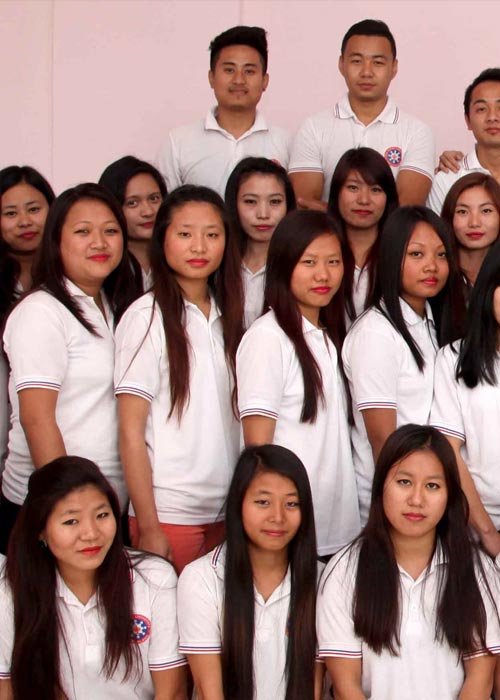MA Economics Program
About the Program
The Department offers a Master of
Arts (M.A.) Program in Economics,
which reflects new developments
in the discipline. The curriculum
has a strong theoretical and
quantitative focus which would
help and train the students in the
use of computers and statistical
software essential in their
professional careers in academia,
research institutions, government,
and industry. The M.A. Program is
semester-based.
A student can opt for M.A
Economics subject to fulfillment
of certain eligibility criteria. The
objective of the program is to
produce post graduates equipped
with the knowledge, skills to
broaden one’s understanding
of markets and the economy
which will give one a chance to question some of the unexamined
assumptions about how society
is organized and how it should be
organized. It will also help improve
one’s ability to make decisions and
see the unseen.
Duration 
Two years
Eligibility

The candidate must have passed in B.A/B.Com (Pass or Hons)/BBA with an aggregate of 50% of marks or equivalent CGPA. (5% relaxation for students belonging to SC/ST/OBC/ PWD).
Program Structure
The M.A. in Economics is a two-year fulltime Program comprising of two summer and two winter semesters. It consists of twenty courses, of which 18** are compulsory core courses and 2 are Extra-Departmental courses. (**in lieu of two compulsory papers in the 1st and 2nd semester, students can opt to write a dissertation in the 3rd and 4th Semester which carries the same credit). Every student is required to complete the Program within a span period of four years of initial admission.
The University follows a Creditbased semester system of teaching-learning and evaluation, and the total Credit of this Program is 76.
Award of Degree
Students who successfully complete the M.A Economics Program will be awarded the Master of Arts Degree by the University subject to a minimum attainment of 5.5 CGPA.
Admissions Office :
The ICFAI University, Nagaland,
6th Mile, Sovima Village, Dimapur, Nagaland - 797112
Mobile : +91 8729880506, +91 7640902799
E-mail : admissions@iunagaland.edu.in
Website : www.iunagaland.edu.in.

| Particulars | MA Economics |
| Last date for submission of Completed Application Form | August 11, 2023 |
| Last date for payment of Admission Fee | August 16, 2023 |
| Commencement of Regular classes | August 16, 2023 |
| Payment of First Semester Fee | September 12, 2023 |
| MA Economics Program Structure | |
|---|---|
| Semester I | Semester II |
| Theory of Money Output and Employment | Micro Economic Theory |
| Classical Political Economy | Political Economy of Development |
| International Trade and Payments | Public Finance |
| History of Economic Thought | Capital theory |
| *Economics of Health and Education | *Environmental Economics |
| Semester III | Semester IV |
| Theories of Economic Growth | Evolution of Indian Economy since Independence |
| Theories of Economic Development & Planning | Research Methodology in Economics |
| Mathematical Methods for Economics | Econometrics |
| Statistical Methods for Economics | Elective |
| Skill Enhancing Courses (Extra Departmental)* | Skill Enhancing Courses (ExtraDepartmental)* |
**To be selected by the students from other streams of Postgraduate Departments
List of Electives (Any one for Semester IV):
Money and Financial Markets; Industrial Economics
Admission Modalities
The Admission Modalities are with reference to the campus-based MA (Economics) program offered by the ICFAI University at Nagaland. The medium of instruction is English.
Eligibility
The candidate must have in B.A / B.Com (Pass or Honours) / BBA with an aggregate of 50% of marks or equivalent CGPA. (5% relaxation for students belonging to SC/ST/OBC/ PWD)
General Note:
For the purpose of determining eligibility based on aggregate percentage of marks, the procedure used by the respective University in award of the degree will only be taken into consideration. All applicants should have completed a minimum of 15 years of formal schooling by
Students in their final year bachelor’s degree course are also eligible to apply, provided they complete their graduation requirements including practical examinations/viva assignments before August 01, 2023. Such applicants will have to produce a certificate to that effect at the time of admission. The admission of such applicants will, however, remain provisional until they produce mark sheet/ transcript and a degree certificate establishing their eligibility. The last date for submitting the proof of graduation transcripts is September 01, 2023, failing which the provisional admission will automatically stand cancelled, and no fees will be refunded.
The process of admission and selection of eligible candidates
The selection of applicants into the Program is made through screening of application and interview. While evaluating students for admission, due weightage is given to their academic distinction, awards in Games & sports, Literary & cultural activities, and other extra cocurricular activities.
Original certificates and Domicile certificate should be produced for verification at the time of admission. The admission decision will be communicated after the admission process.
Special Reservation
There shall be a special provision for admission of students belonging to the State of Nagaland (Domicile) in any course of ICFAI University, Nagaland, which shall not be less than 25 (twenty-five) percent of seats in each course/discipline subject to the students meeting the minimum qualifying requirements referred to above. The fee for the Domicile students is less than that of the non-domicile students (please refer the fee chart).
Seats remaining unfilled under special reservation may be filled up by allotting the same to students belonging to Open Category.
Application Modalities
Guidelines
The candidates are advised to read the guidelines carefully before completing the Application Form for admission.
Application Form
- Please make sure that you meet the eligibility criteria before filling up the form.
- Fill the Application Form in Capital Letters.
- Provide all the available information under appropriate sections.
- Make sure to sign the Application Form.
- Retain a photocopy of the completed Application form.
- Cost of the Application material for UG Programs is Rs. 250.
- Cost of the Application material for PG and Doctoral Programs is Rs. 350.
Applicants have to enclose self attested copies of the following certificates
- Birth Certificate
- Class X Admit Card, Mark Sheet and Certificate.
- Class XII / Degree Admit Card, Mark Sheet and Certificate (as may be applicable).
- *BA/BBA/BCA/B.Com Degree Admit Card, Marksheet and Certificate (as may be Applicable)
- ST Certificate.
- 3 recent Passport Size Photo.
- Any other certificates pertaining to academic and other activities. *For MA/MBA Candidates.
Fee Schedule
Admission FeeAdmission fee of Rs. 10,000 (non-refundable) is to be paid by all the selected candidates of PG immediately after the admission decision is announced. The last date for payment of admission fee is August 16, 2023 for MA (Economics) program.
Program FeeStudents must pay the program fee on the fi rst day of each semester, after which a fi ne of Rs. 20 per day will be charged. The first semester fee is to be paid on or before September 12, 2023 for MA (Economics) program.
Note: Domicile refers to Students from State of Nagaland. Non-Domicile refers to Students from States other than Nagaland.
| Particulars | Domicile | Non Domicile |
|---|---|---|
| (amount) | ||
| Total Program Fee | 98,600 | 1,11,200 |
| Examination Fee | 4,000 | 4,000 |
| Total Program Fee(4 Semesters) | 1,02,600 | 1,15,200 |
| Fee Per Semester | 25,650 | 28,800 |
All Payments should be made through Bank Challan from ICICI Chumukedima Branch/Swiping machine from the University, in favor of "The ICFAI University, Nagaland - Fee Collection A/C". Details about the payment modalities, and the relevant Challan, can be obtained from the Dy. Accounts Officer.
Refund Policy
As per UGC guidelines if a student chooses to withdraw from the program of study in which he/she is enrolled, the institution concerned shall follow the following four-tier system for the refund of fees remitted by the student.
| Sl. No. | Percentage of Refund of Aggregate Fees | Point of time when notice of withdrawal of admission is served to HEI |
|---|---|---|
| 1 | 100% | 15 days before the formally-notified last date of admission |
| 2 | 80% | Not more than 15 days after the formally-notified last date of admission |
| 3 | 50% | More than 15 days but less than 30 days after formally-notified last date of admission |
| 4 | 0% | More than 30 days after formally notified last date of admission |
